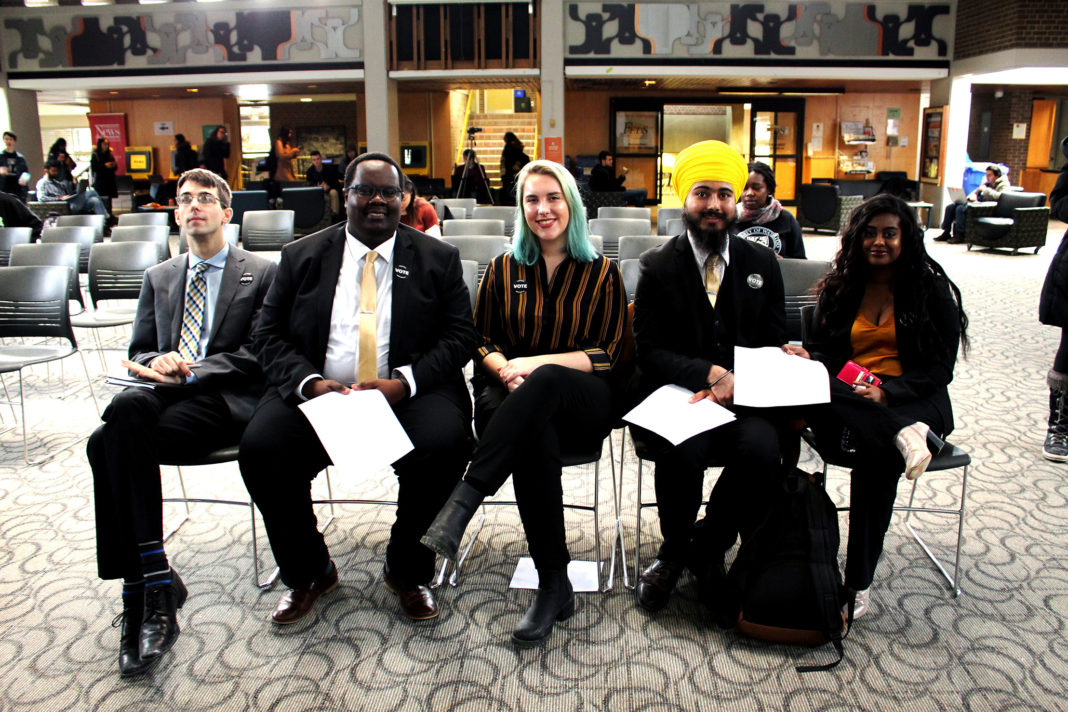Joshua Mbandi always had to micromanage his tone and his image to other people, or he risked being seen as nothing more than his emotions.
“You have to be careful not to play to the stereotypes that are associated with your race or with your gender or whatever else and that factored into when we were making decisions… [during the debate] I wouldn’t want to start talking too loudly or getting angry when debating with Seneca because if I started to look angry on the debate stage, then people would say, ‘that’s just an angry black man,’” Mbandi said.
The elections in early February had five students of colour running for executive positions, but the four white candidates were chosen. After the announcement of results on Feb 8., Amanda Fitzpatrick, VP Student Life-elect, drew attention to this fact in a Facebook post.
“There were nine separate candidates running under three slates and only the white candidates, myself included, were elected. Although everyone running in this election had great qualifications we need to have a conversation about the clear systemic issues that hindered and continue to hurt students of colour that run for student government,” Fitzpatrick said in her post.
Mbandi said he’s glad to have had the experience of running and isn’t directly blaming racism for not getting elected, but he wants to highlight privilege.
“You sort of have to go out of your way to avoid the stereotypes that are associated with who you are, and sometimes that hinders your ability to be honest, because now, you can’t give an honest reaction because now you have to cloud it in a non-angry-black-man’s perspective. And that’s not just true for the campaign, it’s true in life,” Mbandi said.
Two of the members of Team Ignite — Seneca Velling, VPOF-elect, and Michael Beauchemin, president-elect — were elected onto the exec team. The only person of colour (POC) on their team, VP Student Life (VPSL) candidate Tomson Tran, was not elected.
Tran attributes his loss more to the competence of Fitzpatrick for the role than to his race.
“I honestly don’t think race played too much a role … I want to say it was a close call [between me and Amanda], but it wasn’t: she destroyed me,” he said. “I think, in a way, a lot of the services did vote for Amanda because she has been a very active role in the services where I’ve only really been active in the student government kind of role.”
Opinions on whether race played a role in the results of the election were mixed among the candidates.
Where Tran stated that race had a minimal role, others feel differently. The election was democratic so Fayza Ibrahim and Simran Parmar, Tema Gold’s VP Education (VPE) and presidential candidates, said that it is impossible to know the extent to which race was a factor in each voter’s decision.
“This was a democratic election, I think the student body chose who they saw fit to be their representative. Did race play a part? Potentially. I think that, like I mentioned before, it was interesting that the only POC on Team Ignite also didn’t get elected in, given that their platforms were perhaps more in cohesion with one another,” Ibrahim said.
Fitzpatrick also stated that all people have biases ingrained in them, and these biases lead to marginalization of some groups.
“To see students vote in the white students from three separate slates and completely disregard the students of colour that were running showed the presence of tour campus’ unconscious bias,” Fitzpatrick said.
Parmar said that he will look at his loss in the elections as a learning experience in his career, and hopes that the executive team will continue to consult students from various backgrounds in their decisions.
“I never play the victim card; I never like to blame external things for my failures but, at the same time, it is questionable that certain people from each team got elected,” Parmar said.
Mbandi had stronger opinions. For him, it was a given that race factored into the decisions of voters, even if it was at a subconscious level.
“I’m not going to sit here and cry foul or anything … race is not something that can be avoided, and in politics, where opinions and emotions are magnified, race will inevitably be magnified as well,” Mbandi said. “If anybody ever says that race doesn’t play a factor, they’re lying … I can’t speak to why students chose not to vote for us, I’m sure everybody has a reason.”
Other members of Team Gold also revealed the additional barriers they faced during the campaign. Ibrahim said they had to focus on how each of their actions would be received by the public, whereas the other teams did not.
“Just being a minority, it felt like we had to almost be faultless and it caused a lot of pressure during the campaign preparations … We felt that our actions could put our entire cultural background on point, potentially in a negative way. We felt that we wouldn’t be judged individually — our cultural background would be judged as well,” Ibrahim said.
Parmar and Ibrahim both said the potential public perception of Team Gold’s actions occupied much of their discussion and planning during the campaign period.
“A lot of the times when we were having group meetings, we would sit down and kind of think about what the common stereotypes are when it comes to how people perceive us as people based on our backgrounds. Even during the debate, I personally didn’t want to get too heated because there’s always that [assumption] that minorities get angry pretty easily and that we’re just angry and violent people,” Parmar said.
Mbandi stated that even making the decision to run for positions of power and leadership can be difficult.
“There’s a financial barrier, there’s the fact that you’re putting yourself in a vulnerable position, there’s the things about stereotypes that you have to be conscious of, so there’s a lot of different things that you have to think about and I would suspect that’s part of the reason by POC and minorities choose to not get involved in politics as much,” Mbandi said.
If POC do enter political or leadership races, they often face additional barriers in their campaigning.
In the Feds election, the qualifications of both Parmar and Mbandi were often minimized. Fitzpatrick said people discussing the candidates believed they had “no experience,” although both have been active in both the campus and the greater KW community.
“The one thing that kind of annoyed me the most during this campaign — and you could see it in Facebook posts and we saw it all over Reddit, and it was pretty obvious that it was an attack against me: for some reason, my experience equated to absolutely nothing when I was compared to the other candidates in this election,” Parmar said. “No one made mention to any of [my experience] when it’s all on my LinkedIn, it’s all on my bio in the Feds website, it was in our posts on social media; but every time people were talking about my experience, they would say things like ‘Simran has no experience whatsoever.’”
Parmar said these issues are not isolated to small-scale leadership positions. One of his idols is Jagmeet Singh, leader of the federal NDP. Parmar also emphasized the importance of representation, and the pride and respect that he feels for people from marginalized communities in positions of power.
“[Jagmeet Singh] is normalizing this image of a brown man with a turban and beard, it kind of creates this sense of inclusivity,” he said. “But a lot of the times if he does screw up somewhere, if he overreacts in a situation or a little bit of emotion comes out, it’s emphasized so much. They’ll throw so many character attacks at him… [and] when you see these types of things repeatedly, it puts a little bit of pressure on you to act six times more professionally than the other person.”
Students of colour became the inspiration for Parmar; they reminded him of why he chose to run in the elections in the first place.
“One of the things that really kept me going was whenever one of the Indian international students or one of the Pakistani international students came up to me and said things like, ‘I would have never expected somebody who looked like you to be on these posters and running for this type of position.’ I felt as if we were motivating a lot of people to get involved,” Parmar said.
All of the candidates echoed the hope that more students from marginalized populations would become involved with student politics.
“Stand up. Don’t let the stuff you see around you be like that. If you have something that you could do to help — and it’s not easy, it’s hard, and it takes a lot of effort, and it’s draining but it’s worth it, and I hope that more people realize this and more people choose to act on it. We need more voices in politics,” Mbandi said.
“I hope that our involvement could spark more enthusiasm for other students from marginalized backgrounds to be more involved within the campus. I hope that they have the ability to almost be inspired from what we were able to do and I hope that they’re able to aspire to want to be in Feds governance, I think that having as much diversity as possible within our leadership is really important,” Ibrahim said.































